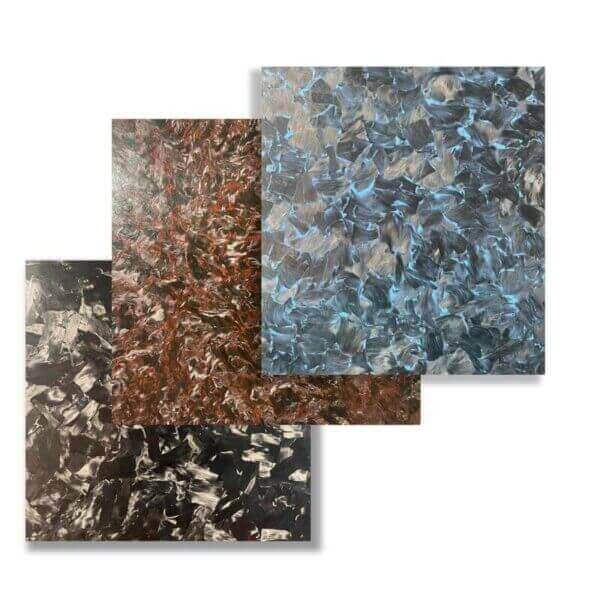Introduction
Forged carbon fiber, also known as forged composite, is a cutting-edge material popular in high-performance industries. It combines high strength, lightweight properties, and a unique aesthetic. This article explores what forged carbon fiber is, how it is made, and why it stands out compared to traditional carbon fiber.What is Forged Carbon Fiber?
Forged carbon fiber is a composite material created by compressing carbon fiber and resin under high pressure. Unlike traditional carbon fiber, which is woven into fabric, forged carbon fiber consists of short, randomly oriented carbon fibers. This process results in a material that retains the high strength and lightweight characteristics of carbon fiber while presenting a unique, marbled appearance.Key Characteristics:
- High Strength-to-Weight Ratio: Forged carbon fiber is incredibly strong yet slightly heavier than traditional carbon fiber.
- Unique Visual Appeal: The random fiber pattern creates a striking, marbled effect.
- Versatile Applications: Suitable for automotive, aerospace, sports equipment, and luxury goods.
The Manufacturing Process of Forged Carbon Fiber
The creation of forged carbon fiber involves several meticulous steps:Material Selection
High-quality carbon fiber pre-preg materials are chosen.Chopping
The pre-pregs are chopped into short, random fibers.Compression Molding
Under high pressure and temperature, the fibers are compressed and molded into shape.Curing
The material is cured under controlled conditions to achieve maximum strength and durability.This process, known as compression molding, ensures the resin thoroughly permeates the carbon fibers, resulting in a dense and robust composite.Forged Carbon Fiber Manufacturing Process
Raw Material Preparation
→
Chopping
Chopping
→
Mixing
Mixing
→
Molding
Molding
→
Curing
Curing
→
Demolding
Demolding
→
Finishing
Finishing
→
Inspection
Comparison of Forged Carbon Fiber and Traditional Carbon Fiber
Forged carbon fiber offers several advantages and differences compared to traditional carbon fiber:- Strength and Weight: Forged carbon fiber provides good strength, though typically lower than traditional carbon fiber, and has a slightly higher weight.
- Visual Appeal: Its unique marbled effect is highly sought after in luxury markets.
- Sustainability: The manufacturing process produces less waste, making it more eco-friendly.

Applications of Forged Carbon Fiber
Automotive Industry
Forged carbon fiber is used for performance and aesthetic enhancements in cars. Components such as body panels, interior trims, and aerodynamic parts benefit from its unique appearance and adequate strength.Aerospace Engineering
Aerospace engineers use forged carbon fiber for aircraft components that require good strength and slightly higher weight tolerance. Its excellent impact resistance and durability make it ideal for certain structural elements.Sports Equipment
Manufacturers of high-performance sports equipment, such as bicycles, skis, and golf clubs, benefit from forged carbon fiber. Its unique look and adequate performance make these products stand out.Luxury Goods and Electronics
The unique aesthetic of forged carbon fiber makes it popular for luxury goods and high-end electronics. Smartphone cases, laptops, and watches utilize forged carbon fiber for a sleek, modern look while maintaining durability and lightweight.Case Studies and Customer Testimonials
Numerous case studies and customer testimonials highlight the effectiveness of forged carbon fiber:- Automotive: A manufacturer reported improvements in aesthetic appeal and adequate performance after using forged carbon fiber for their vehicle’s body panels.
- Aerospace: An aircraft manufacturer integrated forged carbon fiber into certain design elements, noting slight weight increases but enhanced visual appeal.
- Luxury Goods: A watchmaker received positive feedback for their forged carbon fiber watch, with customers admiring its distinctive look and feel.


![[object Object]](https://carbonfiber-cnc.com/wp-content/uploads/2023/05/wendy.jpg)